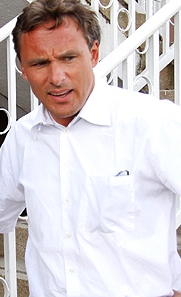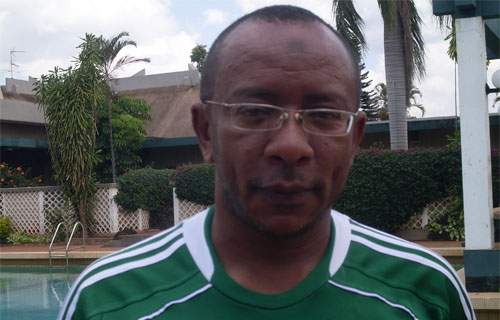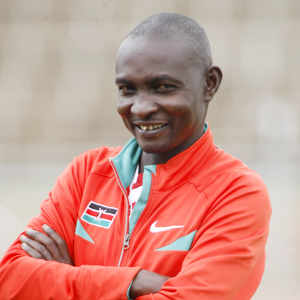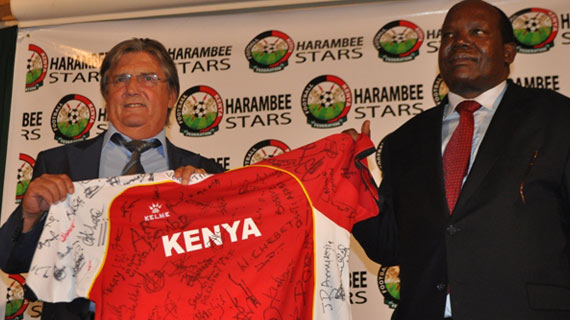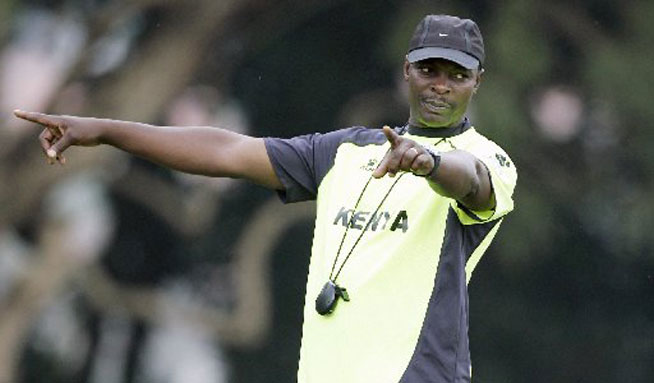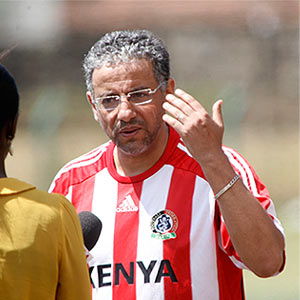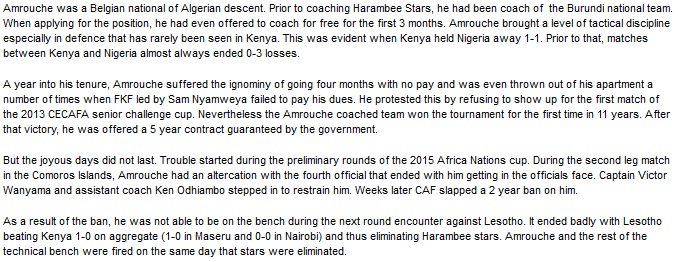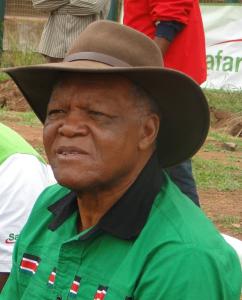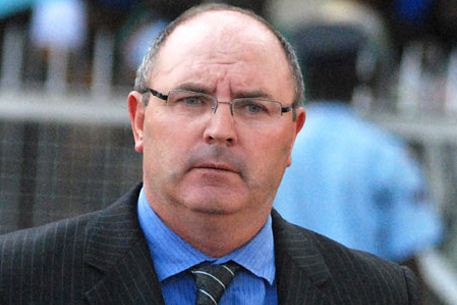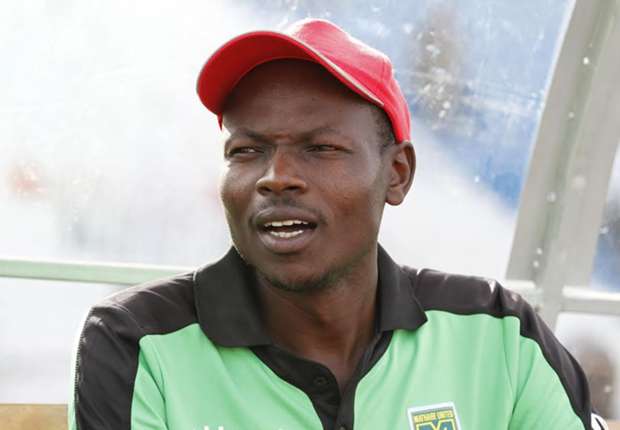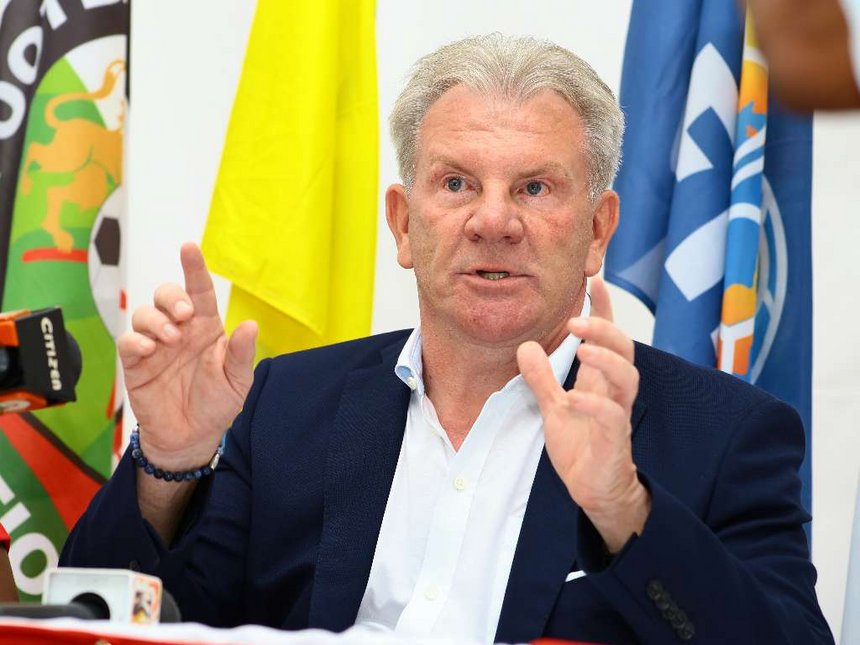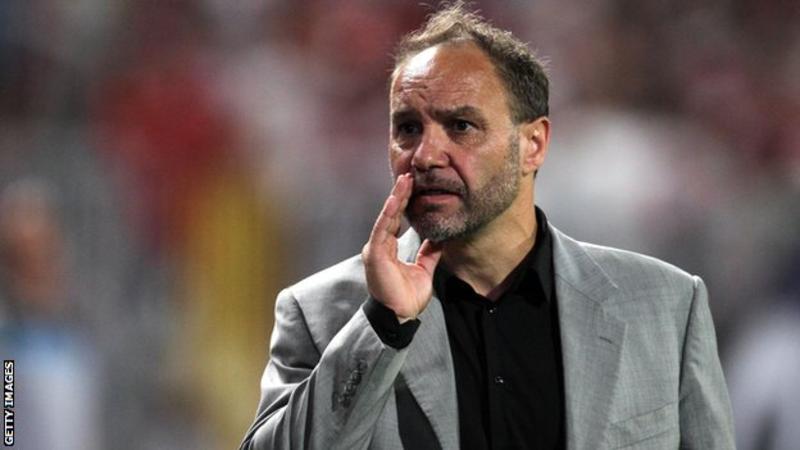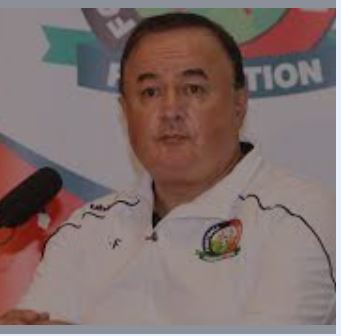Ray Bachelor was a sports officer at Kenya's Coast
province during the colonial days. He first became
national team coach in 1961. His tenure as national team
coach was turbulent. At one point during the CECAFA cup
in Zanzibar, he was forced out after a player revolt. He
was on the bench during the 1965 match against Ghana
when Kenya lost by the largest margin in its history
(13-0). To be fair to him, he had taken over as coach
only 4 hours before kickoff after then coach Peter
Oronge developed cold feet and abandoned the team.
Bachelor later became coach of Nakuru All Stars and
steered them to winning the national league title in
1964. Peter Oronge Peter Oronge had been one of the best players for
Kenya when the country gained Independence in 1963. A
short while later he was appointed national team coach
based largely on his exploits as a player. He gained
infamy in 1965 when he abandoned the national team only
hours before the match against Ghana that was played to
Celebrate Kenya's first anniversary as an independent
republic. Perhaps it was the fact that it had just been
announced that President Jomo Kenyatta was going to
attend the match. Jackie Gibbons The Englishman Jackie Gibbons played in the English
league. As a player, he featured as a striker for
Totenham Hotspur in the English top tier league.
In 1956, he became coach of the Israel national team. He
later coached an Israeli side, Hapoel Petah Tikva. In
1966, he came to Kenya as an employee of Coca Cola and
in 1966 he became national team coach. Elijah Lidonde Elijah Lidonde is one of the most acclaimed players
in the history of Kenya football. It is largely due to
his fame that he was selected as national team coach in
1967. Lidonde became famous while playing for Abaluhya
FC. He was reknown for his powerful shots. Legend has it
that in the 1950s, he once broke a European goalkeepers
hand when the atter tried to save a shot from Lidonde.
And mark you in those days, Kenya players played
barefoot. Eckard Krautzun The young German Eckard Krautzun arrived in Kenya in
1970 as an ambitious 29 year old. Harambee Stars was
only his second coaching job after having coach Young
Fellows Zurich. Under his coaching, Kenya qualified for
the Africa cup of Nations for the first time ever. After coaching Kenya, he became coach of the Canadian
national team. He later coached the Vancover Whitecaps
in the North American soccer league. There he coached
world football legends like Teofillo Cubillas of Peru
and Gerd Muller of West Germany. He had an illustrious
career that saw him coach teams in the German
Bundesliga. In 2002, he took the Tunisian national team
to the world cup. Jonathan Niva Niva became player coach as Kenya embarked on their
campaign for the 1972 Africa cup of nations. During that
tournament, Kenya put on a respectable erformance. In
the opening game they lost 1-2 to Cameroun. In that game
Niva scored from a memorable direct free kick. The last
two matches against Togo and Mali ended in 1-1 draws. He was player coach of Abaluhya FC until 1978 when he
retired as a player to become a full time coach. He had
a second stint as Harambee stars coach in 1978. He
helped the German Bernard Zgoll establish the national
yout Olympic centres. Ray Wood Prior to becoming a coach, the Englishman Ray Wood
had been an outstanding goalkeeper for Manchester
United. To this day he is recognized as one of the best
goalkeepers ever to play for United. He was one the
players who was injured during the Muninch air disaster
in which 23 people died including several Manchester
United players. Before becoming the Kenya national team coach, he had
coached the Los Angeles Wolves in the North American
soccer league. He had been national coach of Cyprus. He
coached nya to winning its first ever CECAFA senior
challenge cup. He also coached top Cyprior side APOEL Nicosia.
Besides coaching in Kenya, he also coached clubs in ,
Ireland, Zambia, Canada, Greece, Kenya, Kuwait and
United Arab Emirates. Grzegorz Polakow (Gregory Palakov) The Polish Gregory Palakov coached Kenya during the
1979 CECAFA senior challenge cup where Kenya reached the
final. Kenyan journalist Roy Gachuhi describes Palakov
as a dour man who was more prone to discuss the negative
aspects of his team than the positive ones. Before coming to Kenya, he had coached several teams
in the Polish top tier and second tier leagues including
LKS Lodz and Lechia Gdansk. As a player he had also
played for Lechia Gdansk. Marshall Mulwa Marshall Mulwa is considered perhaps the most
succesful coach ever to coach the Kenya national team.
Under him, Kenya won three succesive CECAFA senior
challenge cups from 1981 to 1983. In two of those ournaments, Kenya beat the host team in the finals.
Those who played under Mulwa say he was not much of a
tactician but his biggest strength was his motivational
skills. He could literally get players to run through
brick walls for their country. Mulwa's also made it a
point to select players from as many teams as possible
and also made it a point to select players from a wide
variety of ethnic backgrounds He did not want the
national team to be dominated by 2 or 3 ethnic groups.
Mulwa said this was because in the early 1970s he was
denied a spot in the national team because of his Kamba
background. Bernard Zgoll The German Bernard Zgoll was Kenya coach in the 1970s
and again briefly in 1984. He is most famous for having
the Olympic Youth development centres all over Kenya to
identify and groom young talent. These centres nurtured
several ppayers who later made their mark for the
national team including Wilberforce ulamba, Dick
Anyanga, Sammy Taabu, Joseph Odera, Josphat Murila and
Sammy Onyango. But as national team coach, the results
were not forthcoming and Kenya fans who wanted immediate
results lost patience with Zgoll. So he left Kenya for
the Philipines and with is departure, the Olympic youth
centres also fell apart. Chris Makokha Chris Makokha had made his mark as a brilliant
identifier of youth talent and as coach of Kakamega
based Motcom FC . While at Motcom he also doubled up as
coach of Kakamega high school. It was here that he made
his mark leading the school to multiple national schools
championships and grooming dozens of players who later
played for Kenya's top clubs. No Kenyan coach has
groomed more talent than Makokha. Whereas he was a
brilliant youth coach, he had little to no success at
the national team level. He was coach at the 1987 CECAFA
cup and the 1988 Africa cup of nations, both of which
were disastrous performances by the national team. Danilo Alves The Brazilian Danilo Alves had a very short stint as
technical advisor for harambee Stars. It happened in
early 1988 when Harambee stars embarked on a month long
tour of Brazil to enable them to prepare for the 1988
Africa cup of Nations. During the tour, Alves was
seconded to Harambee stars by the Brazilian Federation.
Previosly, Alves had coached top Brazilian side Botafogo
in the late 1970s. During the three matches Kenya played
at the 1988 cup of nations, one could decipher a
definate Brazilian flavour to the way they played. There
was a lot of short passing and plenty of possession. It
was tika taka before Spain used it at the 2010 world
cup. Unfortunately it was tiki taka with no chances
created. Gerry Saurer Gerry Saurer was an Austrian hotelier whose football
coaching credentials were unclear. In the mid 1980s, he
was hired as coach of AFC Leopards. In 1990 he became
coach of the Kenya under 21 team.He traversed the
country identifying talent and assembled what is
probably the best youth team Kenya has ever assembled.
In 1992 he was appointed national team coach. Saurer was
very adept at identifying talent but as a tactician he
was wanting and focused too much on physical fitness. He
was Harambee stars coach at the 1992 Africa cup of
nations. Vojo Gardasevic The Montenegrin Gardasevic was
hired as Harambee stars coach in 1996 after a stellar
performance as coach of Gor Mahia whom he coached to the
national league title in 1995. His most famous
accomplishment was beating then continental giants
Algeria in a 1996 encounter. Harambee stars
won the first leg 3-1. In the second leg, Gardasevic
employed a unique strategy where he deployed a 10 man
defence, thus taking the "Parking the bus" concept to
extreme levels.
bdul Majid Abdul Majid was hired as Harambee stars coach after
having coached Rivatex FC in the national league. If
there is ant blemish on an otherwise excellent tenure
for Peter Kenneth as KFF chairman, it was the hiring of
Majid. He had not accomplished much as Rivatex coach and
did not accomplish anything as national team coach. Christian Chukwu Nigerian Christian Chukwu was appointed coach in
1998. As a player, Chukwu had an illustrious career with
the Nigerian national team whom he captained to victory
at the 1980 Africa cup of nations. He arrived amid high
expectations. But his tenure did not yield any good
fortune. Kenya finished at the bottom of their group for
the 2000 Africa cup of nations, never having won a
single game. James Sianga ames Sianga had been goalkeeper for the Kenya
national team from Independence until the early 1970s.
He played at the 1972 Africa nations cup. After that, he
had been assistant national v team coach several times
including at the 1988 Africa cup of nations. He was
appointed head coach of the national team in 1999 and
lasted until 2000. He steered Kenya to the 1999 CECAFA
cup final where they lost to Rwanda in the final. Reinhard Fabisch Of all the coaches who have ever coached Kenya, none
have ever been more popular with the Kenyan public than
Reinhard Fabisch. The charismatic German had three
stints as Kenya coach. He first arrived in 1987 as a
youthful but ambitious 36 year old. He had been seconded
by the German government. One of the first things
he did was to organize a monthlong tour of Germany by
the national team. During the tour, Harambee Stars
played 10 friendly matches against lower tier German
teams. The trip paid off as Kenya performed extremely
well at the 4th All African games, reaching the final
and coming within a whisker of winning gold. A few
months later, the Fabisch led Harambee Stars qualified
for the Africa cup of nations after a 16 year absence.
He fell out of the KFF led by Job Omino who famously
remarked "Coaches come in dozens". This did not amuse
the Kenyan public with whom Fabisch had become very
popular. His second stint came in 1997. Upon taking over the
national team, he quickly became impatient with the
senior players. He dropped all of them and went about
recruiting youthful players to replace them. His
youthful charges capatured the imagination of the public
when they went on a winning run. The most famous match
was against the much feared Super Eagles of Nigeria who
had just won the 1996 Olympic gold medal. The youthful
Kenyans held the Nigerians to a 1-1 draw at Kasarani.
Unfortunately Harambee stars fell short of qualifying
for either the cup of nations or the world cup. His third and final stint started in 2001. He once
again went about rebuilding a youthful team. He was the
one who gave Dennis Oliech his national team debut.
Dissapointment came in 2002 when he reached the final of
the CECAFA senior challenge cup only to loose to hosts
Rwanda. When criticized he responded : "Those
expecting instant results should instead hire the
services of Jesus Christ,”. By then the KFF had lost
patience with Fabisch because he constantly criticized
them for failing to provide support to the national
team. He was this fired in 2002. But the team he built
qualified for the Africa cup of nations after a 12 year
hiatus. Joe Kadenge As far as Kenya playing legends, they do not come any
bigger than Joe Kadenge. As a player, he earned fame as
a winger for the national team in the 1960s. He had been
Harambee stars team-manager several times , most notably
at the 1988 Africa nations cup. Mohamed Kheri Mohamed Kheri is one of the best local coaches ever.
He had several stints as national team coach. The first
was in 1988 to 1990 then again in 1995 and again in
2005. Prior to that, he had been the assistant coach to
Marshall Mulwa in the early to mid 1980s. But he first
came to prominence when he led Bandari FC which at the
time was in the provincial leagues to the final of the
domestic cup, then known as the Moi Golden cup in 1986.
They came agonisingly close to winning it before loosing
to Gor Mahia 0-1 in the final. As coach in 1989, he led the national team to
qualification of the 1990 Africa cup of nations. He also
took the team to the verge of qualifying for the world
cup. This was the closest Kenya ever came to qualifying
for the world cup and the only time that Kenya was still
in contention on the last day of qualifying. On that
last day, Kenya met Egypt in Cairo. Beating Egypt would
mean Kenya qualifies. The two teams had settled for a
scoreless draw in Nairobi. Kenya thought they had taken
the the lead when a header by Austin Oduor sailed into
the net. But the referee cancelled the goal claiming the
Egyptian keeper had been fouled. Had the goal stood,
Kenya might have parked the bus for the remainder of the
game and qualified for the world cup. But the
dissallowed goal opened up the game and Egypt scored
twice to dim switch off Kenya's hopes. Kheri's subsequent stints as national team coach in
1995 and 2005 were far less succesful. In his 2005
stint, he had to deal with Dennis Oliech going strike.
He had gone on strike to protest the shabby treatment
that Kenya players were receiving at the hands of KFF. Bernard Lama Lama had been the goalkeeper of the French National
team. He was appointed Harambee Stars coach by KFF team
led by Alfred Sambu. It was his first head coaching job.
His arrival brought instant interest from France and
there were French TV crews televising Harambee Stars
matches during his tenure. Upon arrival he famously marvelled at how Kenya
players lacked basic football fundamentals like ball
control, tactical awareness and positioning. The poor
management by FKF did not help either and results were
poor. Most notable was a 1-2 loss to Eritrea at home. At one point Lama quit in a huff. On the way out he
heavily criticized the KFF for incompetence and
inability to manage the national team and declared that
he could not work under such conditions. His decision to
quit was secretly welcomed by KFF. Thus when Lama
decided to come back, the KFF declined to give him his
position back. His tenure lasted only three games. om Olaba Tom Olaba was appointed interim coach when Bernard
Lama quit. Prior to that he had also coached several
local teams since the 1980s with Bata Bullets. He had
also coached teams in the Tanzanian league like Mtibwa
Sugar. Jacob "Ghost" Mulee Jacob Muleee earned the nickname "Ghost" during his
playing days when he was a goalkeeper for Kenya
Breweries FC, ow known as Tusker FC. He had several
stints as national team coach. The most succesful when
was his first stint between 2003 and 2004. It was at
this point that he led the Harambee Stars to the 2004
Africa Nations cup after a 12 year hiatus. He had subsequent stints in 2005 and 2007 but these
were not as succesful. At one point he was accused of
using his position as Stars coach to coerce players to
joining Kenya Breweries from where he could market them
to European teams for financial gain. Francis Kimanzi Kimanzi had two stints with the national team. The
first was from 2008 to 2009 and the second from 2011 to
2012. His first stint was far more succesful than the
second. Prior to coaching Harambee stars he had coached
Mathare United and led them to winning the league title
in 2008. His defining moment however came during the
qualifiers for the 2010 Africa Nations cup and World
cup. As coach he led the national team to its highest
ever FIFA ranking at 69. He led the team to identical
2-0 wins at home to Zimbabwe and Guinea, a 1-0 win over
Namibia and an away draw with Zimabwe. Fans held banner
signs that read "Kimanzi for President". But he was
equally popular amongst the players especially captain
Dennis Oliech. However at the end of 2008, his boss Bob Munro fell
out with FKL officials and Kimanzi resigned his
position. Even a hue outcry by fans and the Prime
Minister Raila Odinga could not convince Kimanzi to
return. Antoine Hey With the departure of Kimanzi, FKL hired German
Antoine Hey. The decision to hire Hey was typical of the
sheer incompetence of FKL under Mohamed Hatimy. So Hey
was hired in 2009. His record in Africa was spotty at
best. As coach of the Liberian National team, he had not
won even a single game. His record at Harambee Stars was
not much better. Under Hey, Harambee stars lost to
Tunisia both home and away, Lost 0-3 to Nigeria and 0-1
to Mozambique away. His only win was a 2-1 win at home
to Mozambique. But even more pivotal was his acrimonious
relationship with the players especially team captain
and dependable goal scorer Dennis Oliech whom Hey
suspended indefinitely. The Players as well as fans were
clamouring for the dismissal of Hey and the return of
Kimanzi. Meanwhile Hey wanted to prove that he could win
without Oliech. When FKF the brass Mohamed Hatimy, Titus Kasuve and
Erastus Okul intervened to re-instate Oliech, Hey quit
in a huff and was replaced by Twahir Muhiddin. Twahir Muhiddin The vastly experienced Muhiddin has had several
stints with Harambee Stars starting in the 1980s when he
was the assistant coach to Mohamed Kheri. His
credentials are impeccable. He first garnered national
attention when he led unfancied Oserian to win the
national league in 2001. Oserian also posted good
results in continental ootball against Egyptian and
Tunisian sides. Under him Harambee stars often posted good results
and played exciting football. He however was frustrated
by an inept and incompetent national federation
particularly under Mohamed Hatimy. After a
dissapointing 0-1 loss to Guinea Bissau, Muhiddin quit
as national team coach in 2012 saying that the national
federation was useless and was the cause of poor
performances by the national team. edekiah Otieno
Popularly known as "Zico" since his playing days when
he played for Gor Mahia and the national team, Zedekiah
Otieno was appointed interim Harambee Stars coach in
2011. At the time he was also the coach of Gor Mahia FC.
He posted fairly decent results as national coach and
the team showed good structure and a decent level of
tactical discipline. His most famous match was away
against Uganda where the Stars forced the Uganda Cranes
to a scoreless draw thus denying the Ugandans a chance
to go to the 2012 Africa cup of nations. Henri Michel Michel was hired at a colossal salary of Ksh 8
million per month, half of which was to go to him and
the other half to his two assistants.
FKF Chairman Sam Nyamweya had hired him under the
assumption that the government would pay that huge
salary. That was a big miscalculation. On top of that,
Michel was housed at the Hilton hote during his stay in
Kenya. His huge salary was a result of his impressive
resume. He had been the France national team coach when
they won the European Championships in 1984, the Olympic
gold medal in 1984 and 3rd place at the 1986 World cup.
He had also coached several top African national teams
and club teams.
One curious issue was that he could not speak any
English at all. He was completely dependent on one
of his assistants to translate instructions and
interviews. When the 2012 CECAFA cup came around, Michel
declared that he would not coach at the tournament,
terming it a useless tournament. He wanted to instead
focus on the CHAN. Nicholas Musonye , the CECAFA
Chairman took exception with Michel's remarks and even
said that CECAFA did not need Kenya and that Michel
should worry about where the money for his huge salary
would come from. Those words were almost prophetic as
Michel soon quit. It became clear that after four months
on the job, he had not been paid a single cent. ames Nandwa
Nandwa was initially the assistant coach to
Frenchman Henri Michel. When Michel quit, Nandwa was
appointed as interim coach. In 2012, Michel had declined
to take the national team to the CECAFA senior challenge
cup. Nandwa took the team and they managed to reach the
final before loosing to hosts Uganda in the final.
And it was not even the strongest team Kenya could
field since at the time, the Kenya national team had
been split into two: One to play in the CHAN and the
other to play in the CECAFA senior challenge cup. Adel Amrouche Amrouche was a Belgian national of Algerian descent.
Prior to coaching Harambee Stars, he had been coach of
the Burundi national team. When applying for the
position, he had even offered to coach for free for the
first 3 months. Amrouche brought a level of tactical
discipline especially in defence that has rarely been
seen in Kenya. This was evident when Kenya held Nigeria
away 1-1. Prior to that, matches between Kenya and
Nigeria almost always ended 0-3 losses. A year into his tenure, Amrouche suffered the
ignominy of going four months with no pay and was even
thrown out of his apartment a number of times when FKF
led by Sam Nyamweya failed to pay his dues. He protested
this by refusing to show up for the first match of the
2013 CECAFA senior challenge cup. Nevertheless the
Amrouche coached team won the tournament for the first
time in 11 years. After that victory, he was offered a 5
year contract guaranteed by the government.

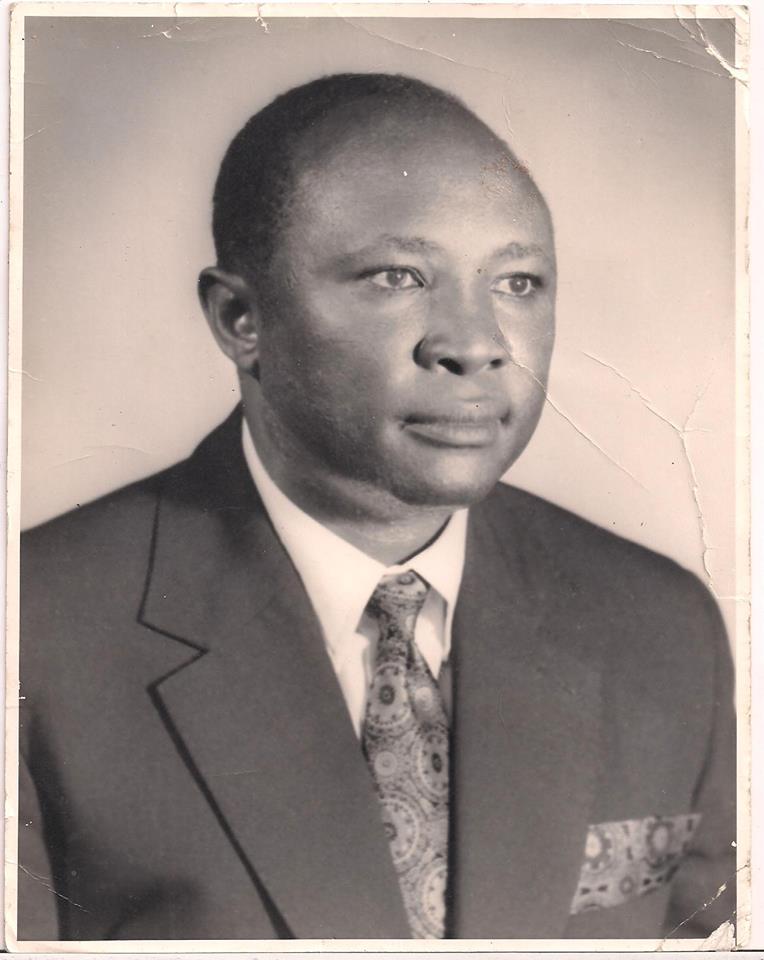

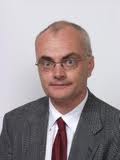


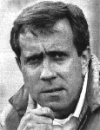

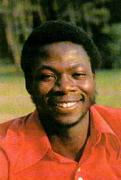



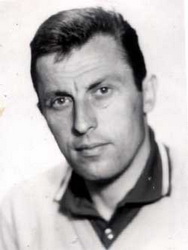

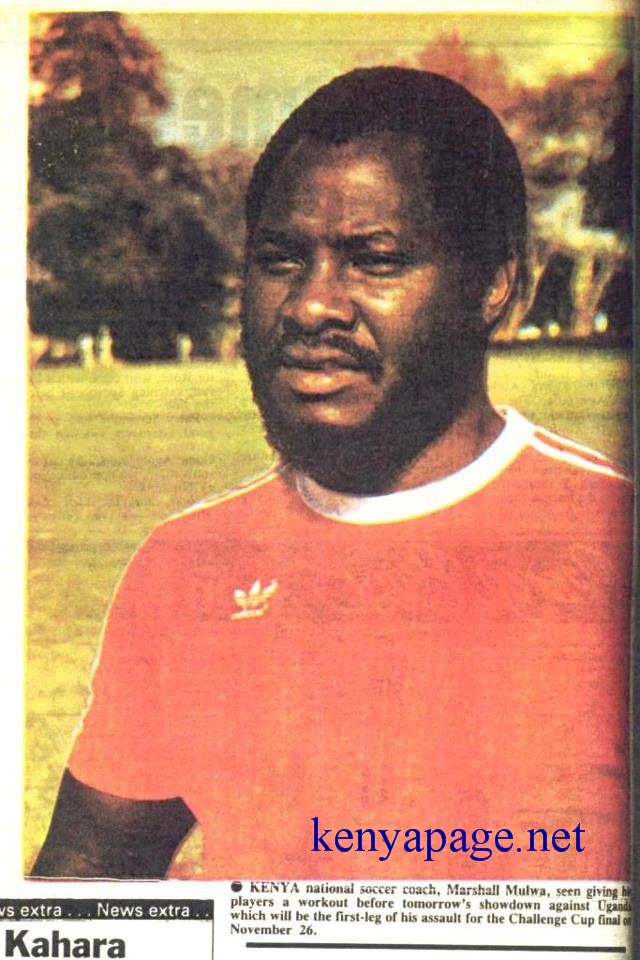

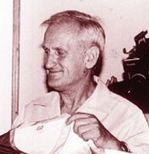

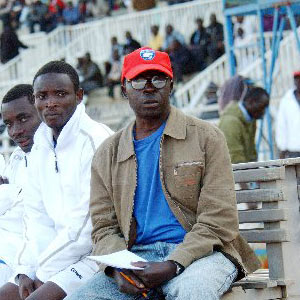




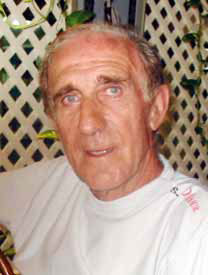




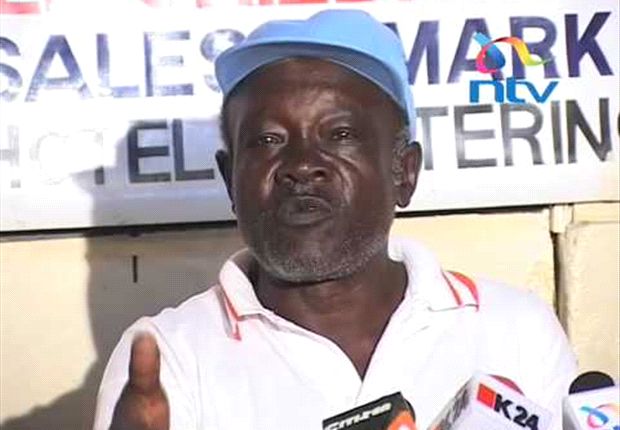

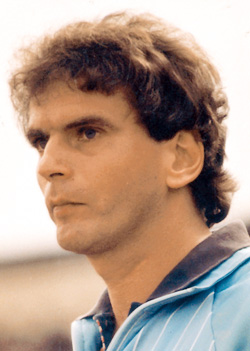
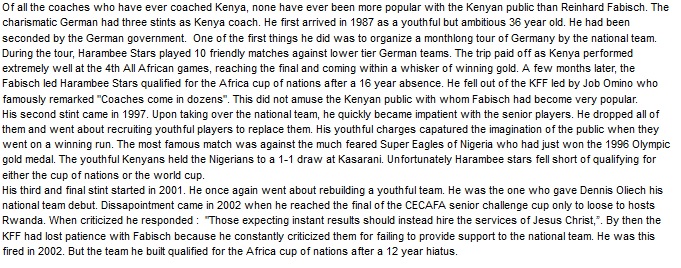
![]()
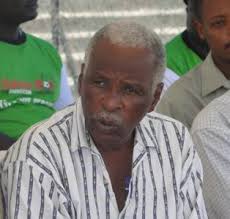
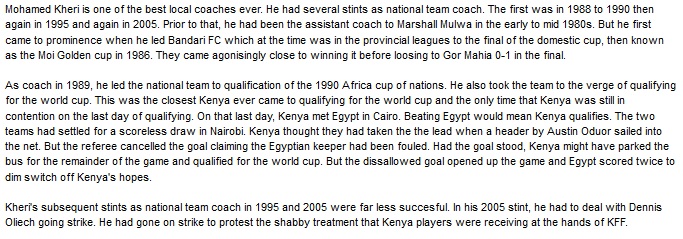
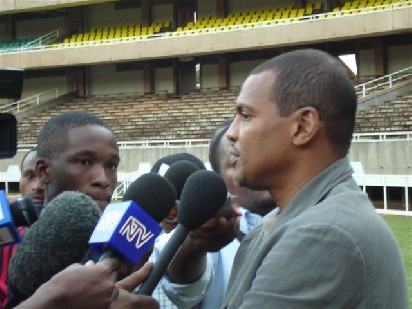

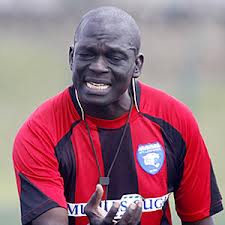
![]()
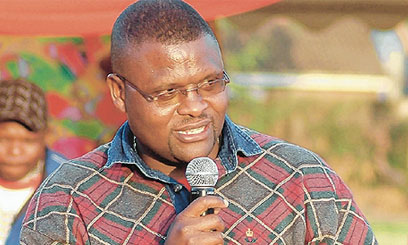

 .
. 